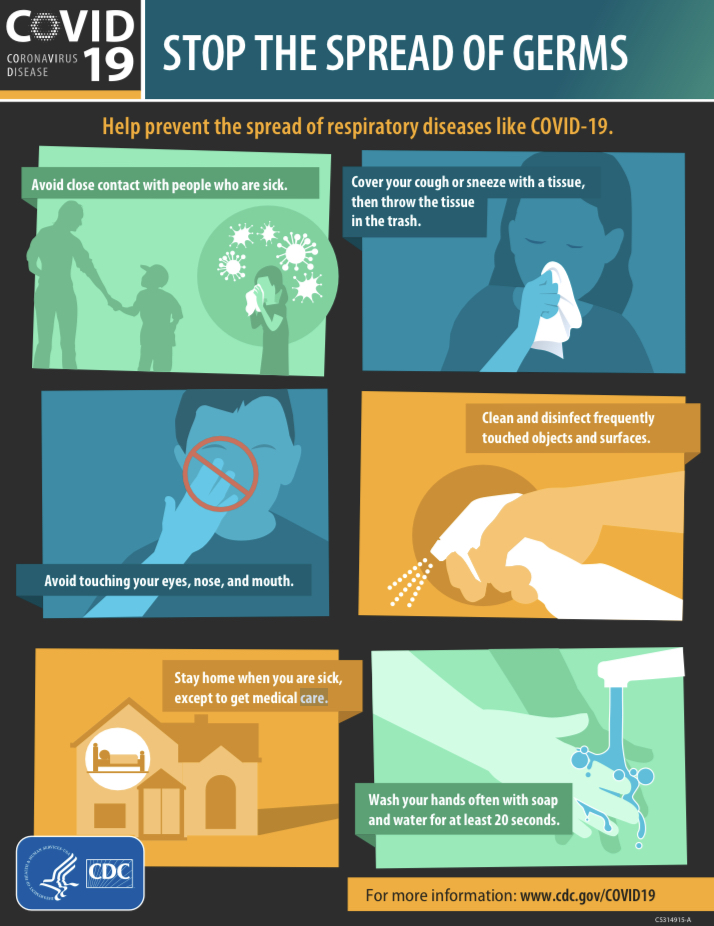

Dr. Julian leads the Peninsula Health District as part of the VA Department of Health. He spoke on the call about what social distancing means and what we should all be doing to help protect ourselves. See the infographics below on what you need to know! Also check out this YouTube video of Peninsula Health District's Emergency Planner Kevin Pearce as he joined The City of Newport News to talk about how to protect yourself.
How can I protect myself from COVID-19?
- Wash your hands often with soap and water for at least 20 seconds, especially after you have been in a public place, or after blowing your nose, coughing, or sneezing.
- If soap and water are not readily available, use a hand sanitizer that contains at least 60% alcohol. Cover all surfaces of your hands and rub them together until dry.
- Avoid touching your eyes, nose, and mouth with unwashed hands.
- Put a distance between yourself and others if COVID-19 is spreading in your community and avoid close contact with people who are sick. This is especially important for people who are at a higher risk of getting sick.
- Cover your mouth and nose with a tissue when you cough or sneeze and wash your hands right away.
- Clean and disinfect frequently touched surfaces daily, such as tables, doorknobs, light switches, remotes, and phones. Most common EPA-registered household disinfectants will work.
- Facemasks should only be worn if you are sick or caring for someone who is sick and unable to wear a facemask. Facemasks may be in short supply and should be saved for caregivers.
How can I prepare my family for COVID-19?
- Create a household plan of action with your household members, relatives, and friends. Look to helpful resources, such as this VDH Pandemic Preparedness Checklist.
- Plan ways to care for people in your life that are at a higher risk of getting very sick from this illness such as older adults and people who have serious chronic medical conditions.
- Talk with your family about COVID-19. Fear and anxiety about a disease are overwhelming and cause strong emotions in both children and adults. Learn more about things you can do to support yourself and your family here.
- Create an emergency contact list and identify aid organizations in your community.
- Establish plans to telework, what to do about childcare needs, plans for pet care should you get sick, and how to adapt to cancellation of events.
How can I prepare my home for COVID-19?
- Get extra supplies such as soap, tissues, cleaning supplies, non-perishable food items, and pet food. If you or a household member has a chronic condition and regularly take prescription drugs, talk to your doctor, pharmacist, and insurance provider about keeping an emergency supply of medications at home.
- Choose a room in your home that can be used to separate sick household members from those who are healthy. Identify a separate bathroom for the sick person to use, if possible.
- Wash household items regularly, including children’s toys, bedding, and towels.
- Regularly clean and disinfect frequently touched surfaces. Learn more about household recommendations for cleaning and disinfecting the virus that causes COVID-19.
What do I do if COVID-19 is spreading in my community?
- Stay informed about local COVID-19 activity and be aware of school and work closures, and announcements from local officials.
- Put distance between yourself and others and avoid contact with people who are sick.
- Stay in touch with others by phone or email. Check in with family and friends who live alone, especially those with chronic diseases. If you live alone, ask family, friends, and healthcare providers to check on you.
- Take care of the emotional health of your household members. Talk to your children about the outbreak, try to stay calm, and reassure them they are safe.
- Stay home if you have COVID-19 symptoms or if you are caring for a member of your household that is sick. Call ahead before seeking medical care.
- Follow your household plan of action and gather additional supplies of prescriptions and over the counter medications, food, and other essentials. Check in on neighbors, elderly, and others to ensure they have what they need.
- Do not take public transportation such as buses, trains, taxis, or ride-shares, if possible.
- Discourage children and teens from gathering in public places while school is dismissed or after school to help slow the spread of COVID-19 in the community.
- Set a good example for children and teens by limiting your contact with others and avoiding public spaces, public activities, and group gatherings.

Stress and Coping
The outbreak of coronavirus disease 2019 (COVID-19) may be stressful for people. Fear and anxiety about a disease can be overwhelming and cause strong emotions in adults and children. Coping with stress will make you, the people you care about, and your community stronger.
Everyone reacts differently to stressful situations. How you respond to the outbreak can depend on your background, the things that make you different from other people, and the community you live in.
People who may respond more strongly to the stress of a crisis include
- Older people and people with chronic diseases who are at higher risk for COVID-19
- Children and teens
- People who are helping with the response to COVID-19, like doctors and other health care providers, or first responders
- People who have mental health conditions including problems with substance use
If you, or someone you care about, are feeling overwhelmed with emotions like sadness, depression, or anxiety, or feel like you want to harm yourself or others call
- 911
- Substance Abuse and Mental Health Services Administration’s (SAMHSA’s) Disaster Distress Helpline: 1-800-985-5990 or text TalkWithUs to 66746. (TTY 1-800-846-8517)
- SAMHSA's webisite for coping with disasters
Stress during an infectious disease outbreak can include
- Fear and worry about your own health and the health of your loved ones
- Changes in sleep or eating patterns
- Difficulty sleeping or concentrating
- Worsening of chronic health problems
- Increased use of alcohol, tobacco, or other drugs
People with preexisting mental health conditions should continue with their treatment and be aware of new or worsening symptoms. Additional information can be found at the Substance Abuse and Mental Health Services Administration (SAMHSAexternal icon) website.
Taking care of yourself, your friends, and your family can help you cope with stress. Helping others cope with their stress can also make your community stronger.
Things you can do to support yourself
- Take breaks from watching, reading, or listening to news stories, including social media. Hearing about the pandemic repeatedly can be upsetting.
- Take care of your body. Take deep breaths, stretch, or meditateexternal icon. Try to eat healthy, well-balanced meals, exercise regularly, get plenty of sleep, and avoid alcohol and drugsexternal icon.
- Make time to unwind. Try to do some other activities you enjoy.
- Connect with others. Talk with people you trust about your concerns and how you are feeling.
Call your healthcare provider if stress gets in the way of your daily activities for several days in a row.
Contact the National Domestic Violence Hotlineexternal icon
Call 1-800-799-7233 and TTY 1-800-787-3224
VA Department of Health
Last updated 3/29/2020

